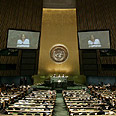
The United Nations Human Rights Council has had a short and dubious existence. In less than a year, the body created to replace the discredited and disgraced UN Commission on Human Rights has not been able to improve on its predecessor, and continues to perpetuate disdain for Israel. All this distracts from the vital mission of the Human Rights Council – to promote and protect universal human rights.
In its nine months of existence, the Council has convened three special sessions, adopted five resolutions, and three decisions – all to condemn Israel. Meanwhile there has been only one watered-down resolution on Darfur, which Sudan prevented from being fully implemented. Sudan has used the Council to claim that only 9,000 people have died in Darfur, instead of the hundreds of thousands experts believe have been slaughtered.
B’nai B’rith’s in-house expert David Matas believes that, “For the Commission, Israel was the world's worst human rights violator whereas for the Council, Israel is apparently the world's only human rights violator.” Despite the name change, the motives of many remain the same.
New body is worse
Initially, we worried that the new Human Rights Council would be as bad as its predecessor. Unfortunately, the new body is worse. Despite then-Secretary-General Kofi Annan’s caution, “Never allow the Council to become caught up in political point-scoring or petty maneuver,” we are now confronted by a series of changes that are as potentially harmful to the whole human rights system as they are to Israel and the Jewish people.
Israel has become both a red herring to disguise ill motives and a scapegoat to take all the heat on the Council. And while we want to protect the UN’s human rights system, it saddens us that those seeking to do the same would, in the process of compromise, encourage the sacrifice of Israel’s status at the UN.
The Human Rights Council is set to meet this month for its fourth regular session at its Geneva headquarters. A B’nai B’rith International leadership delegation will once again be on hand to voice our concerns.
We will demand that human rights standards be applied universally. It is inconceivable that while global human rights atrocities continue, while women are not allowed to congregate publicly in Iran, genocide continues in Darfur, and North Koreans starve to death, that Israel remains the only target of the council.
We will insist that the human rights performance of countries, and not just empty pledges, serve as basic criteria for membership on the Council. One of the reasons for reforming the old Commission was to prevent human rights abusers from hiding within the body to protect themselves from scrutiny.
Israel a convenient pariah
Yet in decreasing the Council’s membership, European and Latin American countries – two regions with strong pro-human rights records – lost several seats.
In its current composition, 17 of the Council’s 47 members are Muslim countries that are in the Organization of the Islamic Conference. Altogether, 28 members of the Human Rights Council participate in the Non-Aligned Movement, a group traditionally known for its anti-Western agenda. Clearly, the numbers are stacked against Israel when it takes only one-third of this membership to call for a special session.
And we will work toward uniform reporting measures for all countries. Some countries seek to eliminate the reporting of country-specific human rights situations, while watering down any effort to develop a system to standardize reporting on each country’s performance.
We will demand that in considering a new agenda, the Council not repeat its predecessor’s obsession with Israel by dedicating one whole item to what it called “the occupied Arab territories, including Palestine,” and another to anywhere else in the world. It troubles us that the Council has already moved in this dangerous direction.
Further, we will urge that countries maintain the special procedure system of experts reporting on various countries and themes. In the past, Jean Ziegler, the Special Rapporteur on the Right to Food, and John Dugard, the Special Rapporteur on “Palestinian territories occupied since 1967,” both have abused their positions to advance radical, anti-Israel agendas.
Future experts must be selected with specific criteria - expertise in their fields, independence from any governmental influence, and demonstrated impartiality and integrity.
The Human Rights Council has been hijacked from its original, much-needed mission. And it continues the bad habits of member states in making Israel a convenient pariah. To gain the moral high-ground, true defenders of human rights must reaffirm their commitment to the Human Rights Council. And the Council must decide to stand with the defenders of all human rights, rather than lay down with the violators.
Moishe Smith is the president of B’nai B’rith International. Daniel S. Mariaschin is the organization's executive vice president















